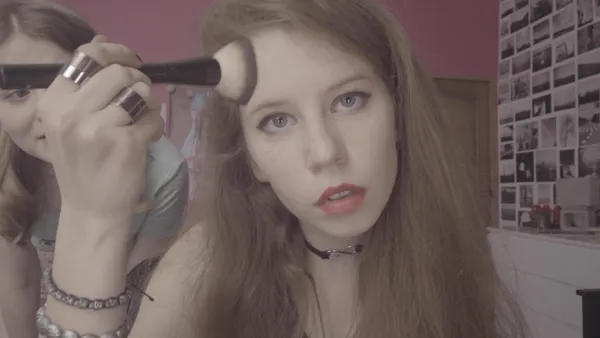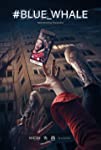Eye For Film >> Movies >> #Blue_Whale (2021) Film Review
#Blue_Whale
Reviewed by: Jennie Kermode

There’s a fine line between talking about suicide and encouraging it. The risk is especially high where there are opportunities for imitation. The Blue Whale Challenge, which became a media sensation around 2015, is generally believed to have begun as a moral panic, but belief in it appears to have subsequently led several individuals to form copycat groups, resulting in deaths. Is it possible to address this safely in a fiction film? How does one balance the potential benefits of raising awareness with the risk of reviving the idea?
Before proceeding further with this review of Anna Zaytseva’s film, which screened as part of Fantasia 2021, here’s a piece of advice: if you’re experiencing suicidal thoughts, please contact one of these specialist services, where you can speak to people who will understand your feelings and can provide you with support. The desire to die, or the feeling that there is no other choice, can be overwhelming in the moment, but a lot of us have passed through that place and found ourselves living fulfilling lives after recovering our equilibrium.

#Blue_Whale concerns itself with what happens when one young woman - Yulia (Polina Vataga) – doesn’t recover but takes drastic action. Left to pick up the pieces is her sister Dana (Anna Potebnya), who feels alienated from her mother by their mutual loss. When she realises that her sister has been participating in the Blue Whale Challenge, she makes a choice which recalls that in 1988’s The Vanishing, signing up for the Challenge herself in order to try and figure out what happened and – perhaps – find those responsible.
What will strike most people first about the film is that it’s presented entirely through the medium of Dana’s computer and phone screens, like a stitched-together collage of recordings (some of these are allegedly erased halfway through but anybody with any knowledge of computer hardware will know that’s not easy to do). This has, of course, been done before in films like 2018’s Searching, and it’s becoming increasingly common, but it’s particularly interesting in this case because of the sheer quantity of data presented on the screen and the fact that the English language version has been massively reconstructed in order to render all this in English too (initially there was an attempt to translate it through subtitling alone, but that really didn’t succeed in conveying the depth of story as expressed through all that other text). The effort recalls the rich translation of 2004’s Night Watch, so viewers will not be surprised to learn that that film’s director, Timur Bekmambetov, is on board as a producer.
The production design involved in all this is extremely impressive and there are ots of parallel stories to be found in the background, which means some viewers will be drawn to watch it multiple times. The behaviour of random group members commenting on what they see is very well observed, sometimes depressing and sometimes very funny. It helps the viewer to suspend disbelief when some of the footage we see stretches credulity as far as the format is concerned – for instance, when we see Dana carefully filming herself even as she runs in terror. It also helps with the psychological word-building, helping to make the character behind it all, Ada Morte (who may be on or several people), an intimidating figure despite her cheesy Slipknot-style mask.
The means through which the whole scheme works involves breaking people down psychologically and isolating them from their friends so that they become easier to manipulate. This is done, initially, by obliging them to connect at 4:30am every day so that their sleep is disrupted, and then by means of a series of daily challenges which grow gradually more extreme (as in films like 13 Sins), engaging participants in Sunk Cost Fallacy – the sense that because they have done so much already they can’t afford to stop now. There are useful lessons here for young viewers about how to identify and resist such manipulation, and the film touches on some of the other contexts in which it’s used.
When that doesn’t work, there’s straightforward intimidation, and here we move into more traditional thriller territory. Some of the secrets that emerge relate to real life discoveries about the Blue Whale Challenge and those who exploited it. The original narrative elements are not particularly strong and most viewers will see the ending coming some distance away, but, despite a few slow patches in the middle, it’s fairly well delivered. Zaytseva makes sure we stay alert to the fact that there are a number of already at-risk teenagers involved, and as she gets to know them, Dana has to reckon with the fact that even if she succeeds in bringing the challenge to an end, she probably can’t save them all.
Is the film exploitative? Perhaps so, but there’s a strong possibility that it will reach at-risk people where support services can’t, encouraging them to reflect on the complexity of their feelings and how they might have been exploited (because bullying doesn’t need to be part of an organised plan). Zaytseva genuinely seems to be trying to help. There’s a focus on the fact that nothing Yulia could have done could stop her mother and sister from loving her, and on the importance of understanding that there is always a way back. The shape of the story also acts as a reminder that anger directed inwards might be aimed at the wrong target.
Social concerns aside, this is a decent little thriller which benefits from very strong design, and Potebnya is a capable lead. though aimed at teenagers it has enough going on to keep older viewers interested too, and it’s smart enough not to be dogmatic about the internet, recognising that although there are predators out there it can also be a tool for connecting with friends who will stick with you no matter what.
Reviewed on: 22 Aug 2021

















